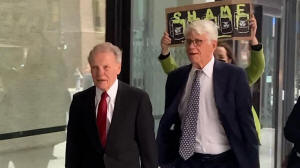Former AT&T exec testifies as Madigan corruption trial enters new phase
 Send a link to a friend
Send a link to a friend
 [December 19, 2024]
By Jim Talamonti | The Center Square [December 19, 2024]
By Jim Talamonti | The Center Square
(The Center Square) – Defense attorneys have begun making their case at
the corruption trial of former Illinois House Speaker Michael Madigan
and codefendant Michael McClain.
After the government rested its case Wednesday, McClain’s defense team
called former AT&T Illinois executive Steve Selcke to testify.
Selcke discussed lobbying and said his full-time job with AT&T involved
lobbying members of the Illinois General Assembly. Selcke said he would
periodically receive job recommendations from lawmakers. Selcke said he
would hope to get credit if he was able to satisfy a lawmaker’s request.
His team made efforts to lobby Madigan’s office and labor unions were
important to the speaker because of their campaign support, Selcke said.
Selcke said McClain had a good reputation as a lobbyist.
McClain attorney John Mitchell asked Selcke about carrier-of-last-resort
(COLR) legislation, which obligated AT&T to provide service to those who
wanted it. Selcke said AT&T began seeking COLR relief in earnest around
2011. Selcke said that by 2017, Illinois and California were the only
U.S. states that had not passed COLR relief. Selcke said COLR relief and
small-cell legislation were at the top of AT&T’s list.

Selcke testified that, in early 2017, after former state Rep. Eddie
Acevedo, D-Chicago, had left office and was looking for work, two
members of the Illinois House Republican caucus told him that if AT&T
was going to hire Acevedo as a lobbyist, they might not look favorably
on the company’s legislative priorities.
Selcke discussed emails related to AT&T agreeing to McClain’s request to
hire Acevedo through a contractor. Selcke said the objective was to find
a legitimate task or appropriate activity for Acevedo to perform.
Selcke said he did not have the feeling that offering $2,500 to Acevedo
would result in Madigan allowing passage of the COLR relief bill for
AT&T. Selcke said none of his AT&T colleagues told him they intended to
trade the $2,500 payments to Acevedo in exchange for Madigan allowing
the COLR legislation to pass.
Selcke said AT&T did not want Acevedo to register as a lobbyist because
that information would become publicly available.
When Selcke and other AT&T officials met with Acevedo, Selcke said
Acevedo’s first question was how much he would be paid and that Acevedo
was insulted when he was told it would be $2,500 per month. Selcke said
the meeting went downhill once Acevedo found out the amount of AT&T’s
offer.
Selcke told Mitchell that AT&T’s lobbying campaign for COLR relief was
expensive and extensive. Selcke told Mitchell he believed it was
millions of dollars over a period of years.
Selcke discussed a meeting with FBI agents when they came to his home in
2019. He said he thought his wife was kidding when she told him the FBI
was there to see him.
Selcke said he had his attorneys present at subsequent meetings. He
confirmed that government investigators provided him with an immunity
letter.
Madigan attorney Todd Pugh asked Selcke about AT&T’s offer to Acevedo in
2017 and suggested that Acevedo might be helpful with the General
Assembly’s Latino caucus. Selcke agreed.
Selcke said AT&T officials did not want to “rock the boat” during the
2017 COLR bill negotiations and upset the speaker’s office. When Pugh
asked Selcke if there even was a boat, Selcke answered, “We knew there
was a boat.”
Selcke told Pugh that union support was critical to COLR legislation,
which passed over a veto by then-Gov. Bruce Rauner.
In cross-examination with government attorney Julia Schwartz, Selcke
said Madigan’s support was critical to getting the COLR bill passed and
said the speaker had the ability to prevent legislation from getting
through the House.
[to top of second column]
|

Former Illinois House Speaker Michael Madigan, D-Chicago, next to
his defense attorney being followed by a protester outside the
federal court building in Chicago Wednesday, Oct. 23, 2024.
- Jim Talamonti | The Center Square

Selcke agreed with Schwartz that McClain served as an emissary for
Madigan.
Selcke said Acevedo represented his district well but was at times very
partisan. Selcke said Acevedo could become belligerent or loose-lipped
when he had too much to drink.
Prosecutors played their final recordings in the case late Tuesday
afternoon, including a wiretapped call from Madigan to McClain on May
10, 2018.
“You were saying that the gaming companies may be in the market ot hire
people, and Eddie Acevedo was in to see me, looking for work,” Madigan
told McClain.
In the last recording prosecutors played before resting their case,
Madigan brought up union opposition to AT&T’s small cell legislation on
May 16, 2018.
“AT&T has got Don Finn from Local 134 as an opponent to the bill. Do you
know, is there anything that AT&T is trying to get around here?” Madigan
asked McClain.
“I don’t think so, but let me inquire without them knowing it,” McClain
answered.
“OK,” Madigan said.
Connie Mixon, professor of Political Science and director of the Urban
Studies Program at Elmhurst University, said the defense might argue
that most people and organizations try to curry favor with legislators.
“Any sort of organization or person that needed legislation or something
from the state would try to build relationships,” Mixon told The Center
Square.
Prosecutors rested their case Wednesday morning after reading a
stipulation about Acevedo’s son, Alex Acevedo, having a separate
subcontract with the Dewey Square Group, which had a contract with
AT&T’s Public Relations Group in Washington D.C. The stipulation
detailed payments Acevedo’s Apex Strategy LLC received from AT&T in 2017
and 2018.
Madigan and McClain are facing 23 counts of bribery, racketeering and
official misconduct in connection with a scheme prosecutors called, “The
Madigan Enterprise.”

Prosecutors allege that ComEd and AT&T Illinois gave out no-work or
little-work jobs and contract work to those loyal to Madigan to get
legislation passed that would benefit them in Springfield.
McClain and ComEd executives and lobbyists were convicted last year in a
related trial, and ComEd agreed to pay $200 million in fines as part of
a deferred prosecution agreement with prosecutors.
In 2022, AT&T agreed to pay $23 million as part of a deferred
prosecution agreement with the government.
Madigan served in the Illinois House from 1971 to 2021 and was speaker
for all but two years between 1983 and 2021. He chaired the Democratic
Party of Illinois for 23 years.
McClain was a longtime lobbyist who previously served as a state
representative in Illinois’ 48th district from 1973 to 1982.
The trial is scheduled to resume Thursday morning at the Everett
McKinley Dirksen U.S. Courthouse in Chicago. A holiday break will take
effect once the court recesses at the end of the day Thursday.
Judge Robert Blakey said the court would not be in session during the
week of Christmas. He said he would hold a charge conference for
attorneys and parties “all day long” on Dec. 30. Blakey told jurors they
would return Jan. 2.
 |